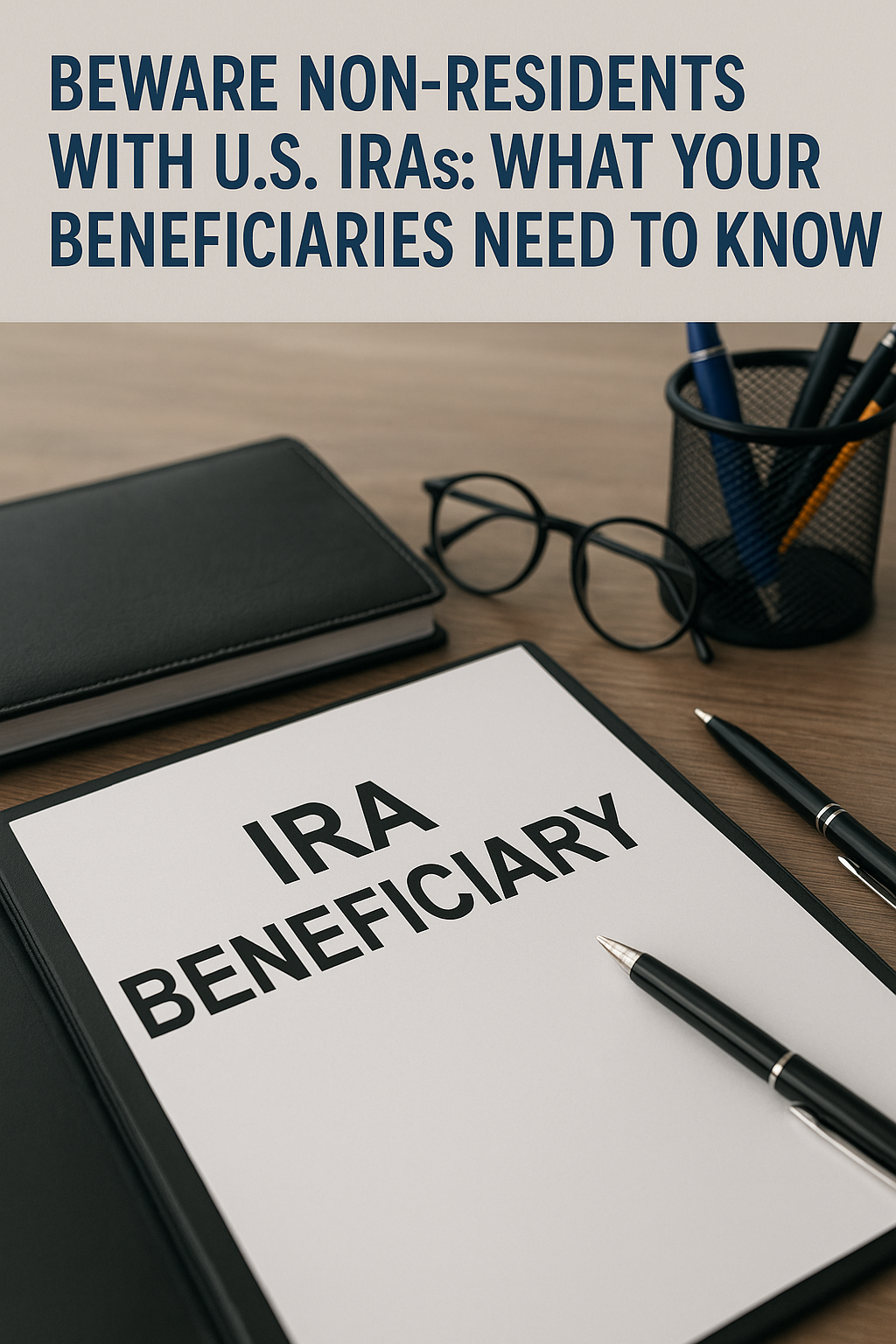Imagine this scenario: you’ve invested in a U.S. property as a Canadian, and now the time has come to sell. While the prospect of a profitable sale is exciting, it also raises a critical question—what are the tax implications? For Canadians with cross-border real estate investments, understanding the tax rules is essential to avoid unexpected liabilities and maximize returns.
At 49th Parallel Wealth Management, we specialize in cross-border financial planning between Canada and the United States. Our comprehensive services—ranging from retirement planning and tax optimization to wealth and estate planning—are designed to help you navigate the complexities of dual taxation and regulatory requirements.
In this guide, we break down the key tax implications when a Canadian sells property in the U.S. and offer actionable tips to help you plan your sale strategically.
Understanding U.S. Tax Implications for Canadian Sellers
When a Canadian sells property in the United States, U.S. tax laws come into play. Here are the main points to consider:
- Capital Gains Tax:
- The sale of U.S. property may trigger capital gains tax on the profit earned both in the U.S. and Canada.
- The gain is calculated as the difference between the sale price and your adjusted cost basis (including improvements and expenses).
- FIRPTA Withholding:
- Under the Foreign Investment in Real Property Tax Act (FIRPTA), the buyer is typically required to withhold 15% of the sale price as a prepayment towards your U.S. tax liability. On a $1,000,000 sale, the buyer will be required to withhold $150,000 and send it to the IRS, regardless of your actual tax liability from the gain.
- This withholding is not the final tax; it’s an advance payment that may be credited against your total tax owed.
- Filing a U.S. Tax Return:
- As a non-resident seller, you must file a U.S. tax return (Form 1040NR) to report the sale and reconcile the withholding with your actual tax liability.
For instance, if you sold a U.S. property for $500,000 and your adjusted cost basis was $300,000, the capital gain would be $200,000. Under FIRPTA, the buyer would withhold $75,000 (15% of $500,000), which you may later adjust when filing your tax return.
Canadian Tax Implications When Selling U.S. Property
Even though the property is located in the U.S., Canadian tax rules still apply to your worldwide income. Here’s what you need to know:
- Worldwide Income Reporting:
- As a Canadian resident for tax purposes, you must report the sale on your Canadian tax return.
- You are liable for capital gains tax in Canada in CAD on the profit, calculated similarly to U.S. rules.
- Foreign Tax Credit:
- The U.S. has first taxing rights because it is U.S. situs property and a foreign tax credit will be available in Canada to avoid double taxation.
- This credit allows you to offset the U.S. tax paid (or withheld) against your Canadian tax liability on the same gain.
- Exchange Rate Considerations:
- Capital gains must be reported in Canadian dollars, so fluctuations in the exchange rate between the purchase date and sale date can affect the final tax calculation.
These mechanisms are designed to ensure you’re not taxed twice on the same income, but they require careful planning and documentation.
Strategies to Minimize Tax Liability
Effective planning can help reduce your overall tax burden when selling U.S. property. Consider the following strategies:
- Plan the Timing of Your Sale:
- Selling in a low-income year may reduce your overall tax burden.
- Consider the impact of exchange rate fluctuations on your reporting.
- Adjust Your Cost Basis:
- Keep detailed records of improvements and selling expenses.
- These costs can increase your adjusted cost basis, lowering the taxable gain.
- Consult a Cross-Border Tax Professional:
- Given the complexity of dealing with two tax systems, professional guidance is invaluable.
- An experienced advisor can help you navigate both U.S. and Canadian regulations seamlessly.
- Work with a cross-border tax expert to ensure you’re minimizing your tax liability.
Actionable Tips for a Smooth Property Sale
To ensure a successful and tax-efficient property sale, follow these actionable steps:
- Evaluate Your Financial Position:
- Review your current cost basis, including all capital improvements and associated expenses.
- Document Everything:
- Keep meticulous records of all expenses, receipts, and correspondence with tax authorities.
- Understand Your Withholding Obligations:
- Familiarize yourself with FIRPTA requirements and ensure the buyer withholds the correct amount.
- File Timely Tax Returns:
- Prepare and file your U.S. tax return (Form 1040NR) and your Canadian tax return, including the foreign tax credit.
- Seek Expert Guidance:
- Consult with professionals at 49th Parallel Wealth Management to ensure your strategy aligns with both U.S. and Canadian tax laws.
Real-World Example: A Dual-Tax Scenario
Consider the case of Alex, a Canadian investor who sold a U.S. rental property for $600,000. His adjusted cost basis was $400,000, resulting in a capital gain of $200,000. Under FIRPTA, the buyer withheld 15% of the sale price ($90,000).
- In the U.S.:
- Alex filed a non-resident tax return to reconcile the withheld amount against his actual tax liability. Alex’s gains are long-term. His capital gains tax liability is only $30,000 so he receives a $60,000 tax refund.
- In Canada:
- The exchange rate was at par (1:1) when the property was purchased; it was 1.38 when the property was sold. This results in a CAD capital gain of $276,000.
- Half of Alex’s capital gains are taxable in Canada, resulting in a taxable capital gain of $138,000 CAD.
- Alex is a successful entrepreneur and investor. He is in the top tax bracket so his CAD tax liability will be 50%+, or over $69,000.
- He reported the gain on his Canadian return and claimed a foreign tax credit for the U.S. taxes paid. His $30,000 USD tax paid results in a $41,400 CAD foreign tax credit. He will pay $27,600+ CAD to the CRA and his home province, in addition to the $30,000 USD to the IRS.
Expert Opinions and Best Practices
Industry experts emphasize that proactive planning and professional advice are key to managing the tax implications of cross-border property sales:
- Integrate Cross-Border Expertise:
- Working with advisors who understand both U.S. and Canadian tax systems can ensure you’re not caught off guard by unexpected liabilities.
- Regularly Review Tax Laws:
- Tax laws change frequently; staying informed can help you adjust your strategy as needed.
- Use Digital Tools:
- Online calculators and resources provided by the Canada Revenue Agency and the IRS can help you estimate your tax liability and plan accordingly.
For additional insights, resources such as Investopedia and the Canada Revenue Agency provide further context on cross-border tax rules
Selling property in the U.S. as a Canadian investor involves navigating complex tax landscapes in two countries. Understanding the U.S. capital gains tax, FIRPTA withholding, and the corresponding Canadian tax obligations—along with the benefits of tax treaties and foreign tax credits—is essential to optimize your financial outcomes.
At 49th Parallel Wealth Management, we are committed to guiding clients through the intricacies of cross-border financial planning. Our personalized approach ensures that you are well-prepared to handle tax obligations in both countries, minimize your tax burden, and secure your financial future.
Take control of your property sale with the right knowledge and expert guidance—your financial well-being deserves a strategy that works across borders. Contact us today to learn how our expert team can help you navigate the tax implications of selling U.S. property and achieve your long-term financial goals.




